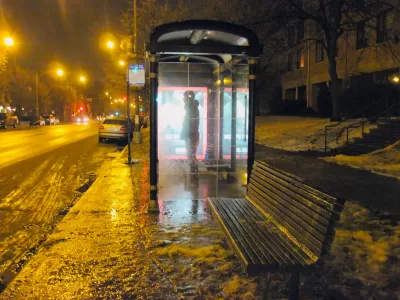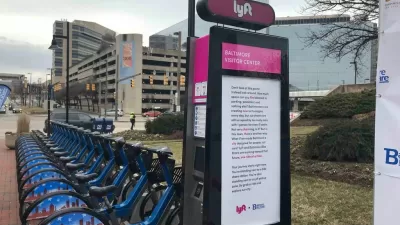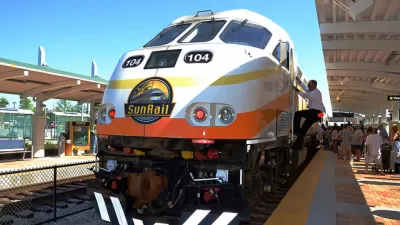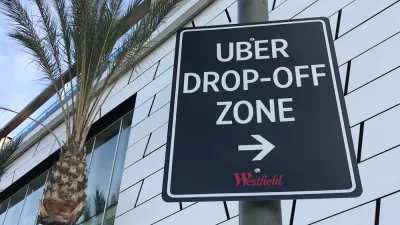Kevin Cashman, a Truthout researcher, asks in this op-ed if lower income people will not only be left out from the transportation technology revolution, e.g., EVs, AVs, car-hailing, but will they be hurt by it?

Purchasing an electric vehicle (EV), or, when they become available, an autonomous vehicle (AV), clearly will be out of the realm of those who may have difficulty affording a $2 bus fare or enough gas to get them to their destination. But other services, particularly ride-hailing, or even, when needed, car share, would seem to be more affordable as they don't involve large capital expenditures.
"The Pew Charitable Trusts recently looked at the burden of transportation costs on the lower third of households and found that it consumed 15.7 percent of their income in 2014, writes Cashman. "(By contrast, transportation expenses were just 8.2 percent of the income of the top third of households.)"
Cashman adds that it's not just about money and income. In fact, problems arise when it is not about cash.
Cities should also be very cautious about supporting new technology that is inaccessible to the poor, such as ride-hailing services, which are usually more expensive than public transportation, are not required to accept cash, and almost always require smartphones and credit cards.
When the private sector competes with public transit
In the near future, it is likely that cities will come under intense pressure to sacrifice public transportation in favor of new, private, car-dependent alternatives, even at a time when city planners are suggesting reducing or even eliminating car use in cities.
Take Altamonte Springs, an Orlando suburb, for example, which on March 21 became "the nation's first city to pay a portion of the fare for all trips with Uber within its limits, according to Christine Mitchell, Uber's general manager in Central Florida," reports Barbara Liston for Reuters on March 3 from Orlando, Fla. (also posted here).
The goal is to integrate the on-demand ride service into the transportation network, get cars off the road and induce people to use mass transit such as SunRail, the two-year-old regional commuter train, said city manager Frank Martz.
Martz said suburban sprawl in Florida has made transportation solutions like bus routes inefficient and unaffordable. He believes cheaper Uber rides also will help those who need public transportation to reach available bus and rail services.
However, advocates for the homeless and poor who rely on buses say this will not help them.
Andrae Bailey, chief executive for the Central Florida Commission on Homeless, argued that the homeless and poor who rely on city buses typically don't benefit from technological solutions because they don't have easy internet access."
Cashman includes UberPOOL and Tesla's 'secret self-driving bus’ in his op-ed as well.
His bottom line: Rather than subsidizing transportation network companies, as Altamonte Springs is doing, "[i]ncreased investment in public transportation -- and a smart strategy to grow cities around public transportation and not cars -- should probably be a focus of any city's development..."
Cashman's question is not a new one — it was the topic of a recent study by the Center for American Progress, posted here: "Should Governments Subsidize Uber and Lyft Connections to Transit?", April 27, 2016, and by Angie Schmitt of Streetsblog USA.
Schmitt concludes that it's "interesting to see some analysis of how ride-hail-to-transit subsidies for commuters might work, [but] it’s still hard to discern a concrete benefit compared to plain old bus and train service."
Also on Planetizen:
- Uber Creeping Into Transit Territory, July 14, 2016 in
- Are Ride-Hailing Services Complementing or Competing with Rail Transit? June 13, 2016, The Charlotte Observer
- Does Ride-Hailing Complement Public Transit—Or Vice Versa?, March 17, 2016, TIME
Hat tip: Roger Diedrich
FULL STORY: Cities Need More Public Transit, Not More Uber and Self-Driving Cars

Alabama: Trump Terminates Settlements for Black Communities Harmed By Raw Sewage
Trump deemed the landmark civil rights agreement “illegal DEI and environmental justice policy.”

Study: Maui’s Plan to Convert Vacation Rentals to Long-Term Housing Could Cause Nearly $1 Billion Economic Loss
The plan would reduce visitor accommodation by 25% resulting in 1,900 jobs lost.

Planetizen Federal Action Tracker
A weekly monitor of how Trump’s orders and actions are impacting planners and planning in America.

Waymo Gets Permission to Map SF’s Market Street
If allowed to operate on the traffic-restricted street, Waymo’s autonomous taxis would have a leg up over ride-hailing competitors — and counter the city’s efforts to grow bike and pedestrian on the thoroughfare.

Parklet Symposium Highlights the Success of Shared Spaces
Parklets got a boost during the Covid-19 pandemic, when the concept was translated to outdoor dining programs that offered restaurants a lifeline during the shutdown.

Federal Homelessness Agency Places Entire Staff on Leave
The U.S. Interagency Council on Homelessness is the only federal agency dedicated to preventing and ending homelessness.
Urban Design for Planners 1: Software Tools
This six-course series explores essential urban design concepts using open source software and equips planners with the tools they need to participate fully in the urban design process.
Planning for Universal Design
Learn the tools for implementing Universal Design in planning regulations.
Caltrans
Smith Gee Studio
Institute for Housing and Urban Development Studies (IHS)
City of Grandview
Harvard GSD Executive Education
Toledo-Lucas County Plan Commissions
Salt Lake City
NYU Wagner Graduate School of Public Service





























